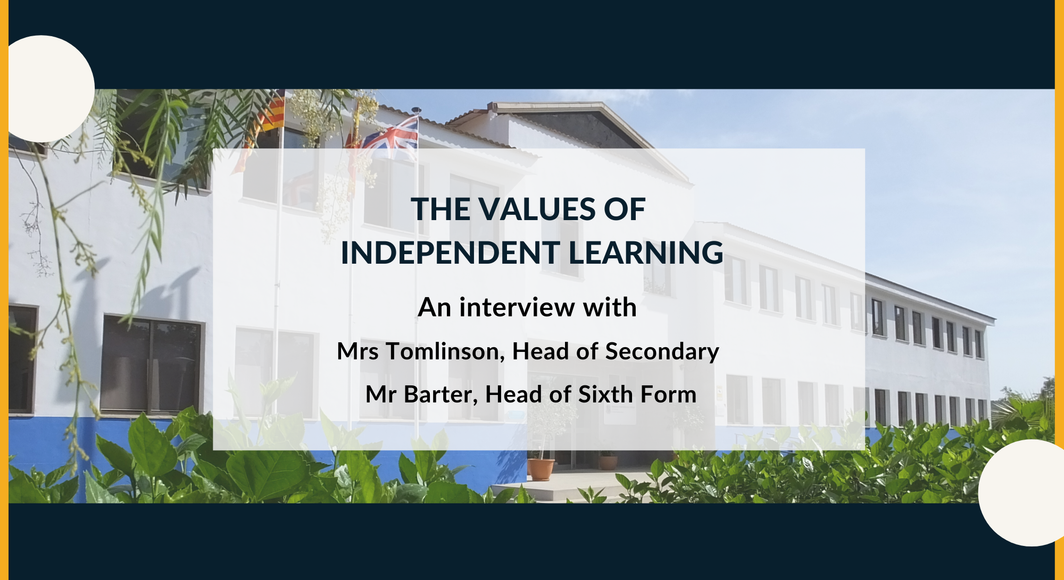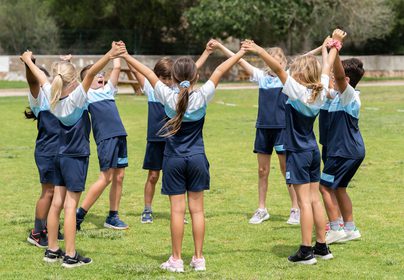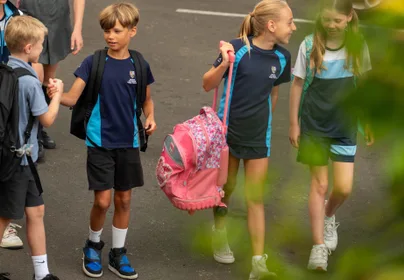The Values of Independent Learning - An interview with Mrs Tomlinson, Head of Secondary and Mr Barter, Head of Sixth Form
Q1. Is it important for students to develop independent learning skills during their Secondary education? And why?
Mr Barter: It is essential that students develop independent learning skills during their secondary education. Our aspiration must be for our students to develop skills that enable a life-long journey in self-directed learning. This will be a basic requirement for university level learning but also for a fulfilling adult life; we want our students to love finding out new things…. forever!
Mrs Tomlinson: Yes, hugely. Higher order skills such as evaluation, analysis and synthesis are developed and honed through independent work. These are the skills which will be needed for success at university, they are the skills most highly valued by employers. Furthermore, these are lifelong skills. They are what make us free thinkers, question the status quo, furnish us with insight into complex issues, allow us to weigh up problems rationally and calmly and help us to be happy!
Q2. How do we encourage independent learning at Baleares International College? And what role does consistency play in this learning path during our students’ secondary journey?
Mr Barter: We encourage this love of learning in a step-by-step way. Early on in school life it will be through supported homework and projects. Increasingly, as they get older, students will be taught how to use online and book sources in a discriminating way to develop their own learning for their subjects, with guided exercises. In the Sixth Form, students need to be much more independent; the wider they read, the greater the level of understanding they are likely to develop for their studies, being in a much greater position to link seemingly unrelated topics - and therefore the higher the grade they can expect at the end of the course. By this age, they should also be raising their own ‘What if…’ or ‘Why…?’ questions and seeking the answers through their own research.
Mrs Tomlinson: Enjoying learning is so important to enabling students to feel that they have the confidence to learn independently. Our teachers are excellent at doing this. The resources they create, their passion for their subjects, making difficult topics, themes and ideas accessible to all is a major part of the art of teaching. Linking pieces of learning together and connecting what is being taught to other areas of the curriculum, wider knowledge and experiences is likewise something that our teachers do brilliantly. Homework, of course, plays an enormous part in this, but sensible homework set with guidance and support and clear time expectations helps to give a framework to learning independently. The consistency of a homework schedule is important but more important is the consistent daily diet of excellent teaching and of an environment of learning safely, securely with constant encouragement and faith from teachers who believe 100% in their students´ capacity for greatness.
Q3. Do you have any tips to help parents encourage and support their children with developing their independent learning skills?
Mr Barter: My major tip would be not to be scared about the value of the internet in developing your child’s ideas and learning. A level of supervision and ‘what did you find out?’ questions would encourage your child to share their learning and for you to encourage critical analysis of the ‘facts’.
Mrs Tomlinson: Firstly, I sympathise with parents who want to help their children. It is hard to strike a healthy balance between support when a child might be reluctant to accept it and adding too much extra work onto a child resulting in overload. One of the best ways that students become independent in their learning is through reading. If they can come to reading by themselves then even better as this helps students to take ownership of their learning. It is not something that their parents have forced on them! They will seek out their own literature and take joy in that. Furthermore, the rewards that come with being able to settle down to absorb the written word in a quiet space are enormous. However, for students who may need more help in getting to this point, parents should try to get them to talk about what they are learning at school. Once again, it is easy to ask the question ´What did you do today?´ and receive a very loose answer! Instead, try to ask - "What book are you studying in English?´ or ´What period of history are you considering in history at the moment?´ or ´Tell me about a recent maths problem that made you think hard.´ Parents are more likely to receive substantial and definite answers to these questions, which allow parents to respond further to. Try then to watch a film or documentary with your child to encourage a wider interest in the topic, take them to a place connected with the topic, recommend a novel or newspaper article that links to it. By doing this you are modelling synthesis - the drawing together of key ideas, connecting the dots and giving an added sophistication to their experience of the topic - taking it beyond the classroom.
Q4. Does independent learning mean working on your own?
Mr Barter: Usually, it would be working on your own; but it may be independent of the teacher, working in groups. Through such group work, the teacher is aiming to develop confidence in sharing and debating information researched.
Mrs Tomlinson: Sometimes, but not always. We need to be able to work alone and in groups. We need to be adaptable and flexible. The current pandemic has demonstrated this starkly and has highlighted the need to be highly self sufficient when needed. Self sufficiency does not mean that we live alone in the wilderness on roots and water! But it does mean that we are skilled enough to be reflective, to be balanced, to weigh up pros and cons, to have the independent drive to ask for help when required, to have the nous to go out and read up and skill up on something when there is a gap in our knowledge and understanding. John Donne wrote ´No man is an island´ - human beings cannot learn alone, that contradicts what learning is. Students learn from others, with others, but also have the skill to think for themselves, to learn individually - this is crucial. Learning is about applying what has been learned and students need time and space to be able to do this - being able to absorb information from and within discussions with other students, with parents and teachers is definitely independent learning but so too is being able to sit and think and write about what you know - alone.
Q5. What is the goal of Baleares International College when our children leave the school?
Mr Barter: In the ideal, our aim is for the skills and a love of life-long learning. In the medium term, to prepare our students for the next step in their education after BIC; for most this will be preparation for university education.
Mrs Tomlinson: Many students and parents will have heard me say that I want our students to be able to enter into new situations after leaving school, with confidence, knowing how to manage whatever those situations throw at them and enjoying those experiences to the full. When I talk about those situations I am not just referring to university. I am talking about beyond that - an ability to do this in every new challenge and encounter that they have throughout their lives. BIC lays the foundations for the self worth that will enable them to feel at ease in enacting this. Also, a joy of learning. To learn and acquire knowledge and new skills because this is what life is about, this is healthy and this liberates us from the ordinary and mundane. Rodin's famous sculpture ´The Thinker´ embodies for me what I hold dear for the students´ future philosophical selves - engrossed in thought but about to spring into action.
Q6. How do we prepare our students to prepare themselves for their university journey?
Mr Barter: As indicated above, we are doing this on a general basis. As the students get older, we will do sessions (in registration and Global Citizenship) that are university focussed; this is also likely to be included in future drop down days. We are also offering webinars for parents and students. We also use the Sixth Form platform to keep the sixth formers regularly updated on university news (open days, application deadlines, scholarships, etc).
Mrs Tomlinson: Teachers with superb expertise not only in their subjects but in what it takes to get into top universities. Mock university interviews, our University and Careers fairs, contacts with admissions departments in universities are all examples of final preparations for university entrance. Some of our teachers have direct links with their Alma Maters and, when we are able to travel again, visits to those universities and departments will be instrumental in helping students to make their decisions. Alongside this, a wealth of opportunities to become involved in the wider life of the school - through House Prefectship, Sports Captaincy, leading on the school´s charity work, working with younger students, key roles in arts productions, joining the new Duke of Edinburgh award scheme, setting up societies - to name but a few. Involvement in these plus academic success are what sets an applicant apart.
Q7. Will independent learning help students to prepare for future life?
Mr Barter: Undoubtedly, in order to be better students and more informed adults.
Mrs Tomlinson: Undoubtedly. Independent learning is also about setting personal goals and getting organised to achieve them, it is about stepping boldly into the unknown by oneself. The process of doing this is invaluable for future life. Students should be encouraged to do this regularly with little intervention by parents or teachers. Pulling the support structures away from students occasionally is a really healthy thing to do. I worry that we are increasingly losing our ability to take risks, particularly that our young people are growing up in a risk averse world. When students try learning by themselves - whether through walking by themselves to the post office or supermarket, up a mountain, camping overnight in a tent in the back garden, picking up a new book, deciding to bake for the first time or doing their homework entirely without help - inevitably the results are that they feel trusted and are thrilled with their individual accomplishments. Independent learning means that students learn from mistakes through failure and difficulties and because they have done so on their own, they are more likely to try again and again to get it right - so important for the future of humankind!
Q8. Here you will be able to find some tips on how to keep your children motivated during their secondary and Sixth Form education.
Mr Barter: Avoid asking ‘How was school today?’ You’ll get an ‘OK’ most of the time and you will assume that it is your child being a monosyllabic teenager.
Instead, take an interest in what they have learnt ‘today’ at school. Ask specific questions about specific subjects. Ask them to develop what they tell you. Maybe save this for shared meal times or car trips so that you can give them the time they need? Having the child’s timetable in a prominent place (perhaps near the meal table), will be a stimulus to you to ask the ‘right’ questions. It will also allow you to check what homework they have and whether it has been done.
Mrs Tomlinson: Try not to overmanage your son or daughter´s time too much. Give them space and freedom to think about their work. Go technology free for an evening a week, or one weekend a month. Play board games. Discuss the news that day/week/month. Ask them questions, even if they don't respond all the time to them - and pick up from them what they are struggling with and enjoying in their studies. Develop your child's enjoyment of a subject by showing them a high quality movie that links to it. Teach them something new that they are not learning at school. Read a play script out loud. Do something practical with your child - like baking, building, setting up a camp. Talk to your child about learning how to learn. Share your own experiences of your learning struggles and how you overcame problems and setbacks. Laugh about failure and encourage them to take sensible risks and try again. Talk and read through examples of famous people who failed and succeeded. Let them succeed and try on their own with academic work, and occasionally read over homework and point out where they could improve. Sometimes extended writing homework can be tricky to get started on for some students - support and help as much as is needed but makes sure that you remove the supports over time. Remember Socrates, ´´Education is the kindling of a flame, not the filling of a vessel."



